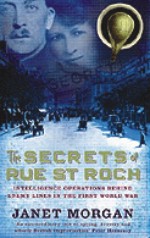|
Book
Review
Spies
with attitude
Janet
Morgan tells how a chocolate-loving housewife, an eccentric
Belgian and an uptight British officer helped the Allies win
the first world war in The Secrets of Rue St Roch
Jane
Stevenson
The
Secrets of Rue St Roch: Intelligence Operations Behind Enemy
Lines in the First World War

by
Janet Morgan
Allen Lane
£18.99, pp416
Though
Janet Morgan's book tells a true story, it reads like the
plot of an inter-war British film. A handsome, aristocratic
young intelligence officer, Captain Bruce, sets up a shoestring
espionage operation in Paris; the secretary he hires is both
a patriotic English beauty and a sophisticated and glamorous
socialite; at the end of the war, romance blossoms, and they
marry. So much for the romantic sub-plot. The thrills and
spills come from the principal active agents in the operation:
a stout, wealthy and respectable bourgeoise from Luxembourg
and a Belgian adventurer of infinite resourcefulness.
The housewife,
Mme Rischard, turns out to be a woman of extraordinary intelligence
and courage, capable of memorising a code of Byzantine complexity
and using it to send detailed messages about troop movements
from the heart of enemy territory. Her immense strength as
an agent derived, paradoxically, from the fact that she continued
to think of herself as a housewife.
Having
finally reached the Luxembourg frontier, after a risky journey
home from Paris which took nearly a year, she initially refused
to enter the country because the German police wanted to confiscate
the Swiss chocolate she had acquired. No spy in their right
mind would have behaved like that; if the authorities had
any doubts about her, these must surely have evaporated.
Her main
preoccupation at home was the state of the stair carpet and
the way the maid had let things slide, beside which organising
an espionage network to report on the movement of German troop
trains through Luxembourg central station was a mere bagatelle.
Education
went both ways. Poor Rischard was required to memorise thousands
of details about the German army, but she refused to be overawed
by the lectures on weaponry and the minutiae of German uniforms.
Instead, she insisted on educating the tight-lipped Bruce
into how to behave like a human being. A touching aspect of
the book is that she succeeded. The last letters he wrote
to her show a man far more capable of acknowledging emotions.
Madame's
usefulness was greatly enhanced by Baschwitz Meau, a Belgian
of Polish extraction, and a Great Escaper of extraordinary
courage and inventiveness. Imprisoned in an apparently impregnable
German fortress, Baschwitz and a British officer fled all
the way to the Baltic before being recaptured. His second
incarceration did not last long either. He bobbed up in Belgium,
offering his services to the British on the grounds that since
his personality and skills were best suited to unorthodox
enterprises of extreme danger, ordinary soldiering was a waste
of his talents.
Danger
the British were ready, willing and able to supply. Enter
Bruce, supported by a collection of English eccentrics, including
Commander 'Pink Tights' Pollock, of the Naval Ballooning School,
with a proposal to fly Baschwitz into Luxembourg by balloon.
This scheme was totally dependent on the wind, which left
the balloonist at the mercy of hostile fire. The ballooning
side of the narrative introduces a welcome element of surreal
comedy. With their skills honed on the creation of mini-balloons
powered by alarm clocks for taking carrier pigeons into enemy
territory, the balloon enthusiasts (aka, for obvious reasons,
the Suicide Club) launched Baschwitz into the air under cover
of darkness. Almost unbelievably, he arrived safely in Luxembourg,
discreetly adding himself to Rischard's household.
Morgan's
book is mutedly effective in striking a balance between the
Professor Branestawm dottiness of clockwork pigeon balloons
and the appalling realities of the context: the thousands
on thousands of men who were dying every month, the fact that
the war hung in the balance, and that the information supplied
by Baschwitz and Madame was of real importance.
As 1918
crept on, the question of where along the immense Western
Front the Germans were concentrating their resources became
crucial: were there weak points and, if so, where? The Luxembourg
information was vital. A German offensive necessitated moving
thousands of troops by train, and the Luxembourg reports gave
the essential information of where these trains were going.
Even for
readers uninterested in military history, the book offers
considerable entertainment; it explores the most human and
unorthodox side of war. It is written as a story about personalities,
with the exposition of the actual code tactfully moved to
an appendix. It is good to know that this all actually happened,
but someone really ought to make a film.
Source:
The Guardian
Copyright
(R) thedailystar.net 2004
| 